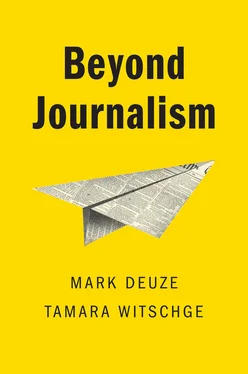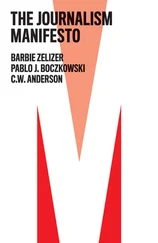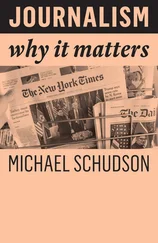The notion of journalism as a form of affective labor is not new, yet remains underarticulated (Beckett and Deuze 2016; Siapera 2019; Cantillon and Baker 2019). The affective nature of newswork gets expressed in the need for reporters to regulate and moderate their emotions and emotional life in order to “make it work” as journalists (for example, to always be amenable and pleasant to work with, to empathize with interviewees and assignment editors, at times to process the trauma of victims or witnesses to accidents and attacks, to nurture relationships with online and offline communities). As an extreme form of affect, journalism can also be seen as a passion project for many involved, at times accepting (or shrugging off) poor working conditions in order to keep doing what one loves doing.
In our project, we aim to go beyond journalism in that our studies articulate the field with those who strike out on their own, while deliberately focusing on the affective dimensions of journalism. The startup journalists we interviewed and observed are not alone in what they do: they are reporters and editors setting up new journalistic entities, starting editorial collectives, building a news business from the ground up, all over the world, across distinctly different journalism traditions and news cultures. In all these instances of entrepreneurial activity and bottom-up initiatives, we looked for the different notions and definitions of what journalism could be, what it means to be a journalist under these conditions, and what issues confront the contemporary journalist operating outside of the institutionalized contours of legacy news organizations.
This book is personal, in the cases and professionals it documents and in our focus on the stories of the heart, as well as in our motivations. Mark is beyond journalism: this is the last major work he will do in relation to journalism. Or so he says. Tamara thinks he is beyond journalism studies , needing to break free of the (perceived) regime of journalism scholars, which seems to leave little space for creative thinking (for a critique of the paradigm see, for instance, Josephi 2013; Zelizer 2013). Any academic work is a balance between “personal creative passion and willingness to submit to tradition and discipline” as Michael Polanyi (1998: 40) puts it. To have our work be recognized as academic work, we play by certain rules. But, as we argue in this book, journalism studies oftentimes can be too limited in scope, resulting in a narrow conceptualization of journalism as a fourth estate (with a subsequent primary focus on national politics and the economy), operated in newsrooms of legacy media institutions, serving a relatively silent and amorphous citizenry. Where Mark experiences a sense of frustration with the recurring debates reinforcing the dogma of the field, the industry, and the profession, and advocates a strategic bypassing of journalism in order to break free, Tamara sees tactical potential through her multiple engagements with the field “elsewhere” and outside the boundaries of established methodological and practical frameworks, and challenges to established ways of seeing (and doing) things.
This then is one of the main aims of the book: to both strategically and tactically affect journalism studies and education, and through that help facilitate more inclusive, diverse, and creative journalism practices. This book can be considered to be both a manifesto and an empirical description of part of the field of journalism. We aim to get journalism studies beyond journalism studies by showing how journalism is beyond (what we have predominantly defined as) journalism. Moving beyond does not – cannot – entail a full divorce from what came before. That which we counter grows from the same intellectual soil that we come from (Ortega y Gasset 1967: 73–4). As José Ortega y Gasset (1967: 74) points out, any creative thought is “shaped in opposition to some other thought, which we believe erroneous, fallacious, and needful of correction.” So, that which we argue against in this book is what at this “particular moment looms above our soil” for us, but our roots are from the same soil, and this book is as much homage to as critique of the very field that we grew up in. And we know that we keep it alive by writing this book as well: as Ortega y Gasset goes on to say, the “adversary is never an ineffectual past: it is always contemporary and seemingly vestigial.” We hope to add as much as transform, and in doing so our actions as academics mirror those of the journalists profiled in this book, especially their hopes and aspirations to both contribute to as well as change journalism.
Our aim then is not to erase our “adversary”; it is not even to combat it. Our aim is to complement and impact the field through telling stories – stories that are somewhat different from those told in mainstream journalism studies not only because of our object of study, our focus on the affective nature of newswork, but also in terms of style. As pointed out by Roberta Štěpánková (2015: 313), we may ask at some point in our academic lives: “Is my storytelling right?” As she reminds us: “there are no ‘correct’ stories, just multiple stories.” This is our attempt to be part of a growing movement among scholars as well as practitioners to make space for different kinds of stories.
We do so by focusing on a particular group of journalists: journalists who are involved in starting up (or who are in the process of setting up) small news companies outside the legacy media. These startup journalists can be seen as pioneers in the field. Pioneering communities are, in Andreas Hepp’s terms, “experimental groupings related to new forms of media-technology-related change and collectivity formation” (2016: 920). Pioneering communities “have a sense of mission” and have “a sense that they are at the ‘forefront’ of a media-related transformation of society as a whole” (Hepp 2016: 924–5). This is very much the case with the startup journalists and organizational contexts we have visited. These newsworkers are keenly aware of the role that they play, not only in society, but also in defining what journalism is as it charts new territory in the twenty-first century. This reflexivity is also something that Hepp refers to as characteristic of pioneering communities, “since they are engaged in a continual process of interpretation of themselves” (2016: 927). Furthermore, the spaces and places our cases use to facilitate their work are varied, constituting a range of pioneering and innovative practices. Oscar Westlund and Seth Lewis (2014) rightly consider “agents of media innovation” not just the individual professionals and communities involved, but also the role technologies, working environments, and other nonhuman actors play. By focusing on this group of journalists and their working arrangements and environments, we are able to add valuable stories of those in the field who are looking to contribute to the conceptualization of what journalism is. Moreover, in our analysis we are focusing on those stories and narratives that attest to the affective nature of the profession, providing much-needed emotional context for the question how these pioneers make it work on their own.
Our project recognizes an overall historical phase, where journalism worldwide is in a process of becoming a different kind of industry: less reliant on legacy news organizations, producing a great variety of contents and services, published across multiple platforms by practitioners in all kinds of formal and informal ways. This phase roughly coincides with the rise of new technologies (notably internet, smartphones, and various forms of automation), the shift of nation-based politics toward more complex supranational relations (as well as its return under the guise of populism), and a rapid glocalization of social, cultural, and economic affairs. The news industry, in response to such changes and challenges, has generally sought answers in consolidating its core business and streamlining existing operations. This meant laying off employees (including many journalists) and cutting budgets. The budgets for exploratory innovation projects, specialized beats (such as science reporting), and a range of correspondents were all trimmed. Journalism was once mostly organized in formal institutions where contracted laborers would produce content under informal yet highly structured working conditions generally arranged within the physical environment of a newsroom. Today the lived experience of professional journalists is much more precarious, fragmented, and networked.
Читать дальше












